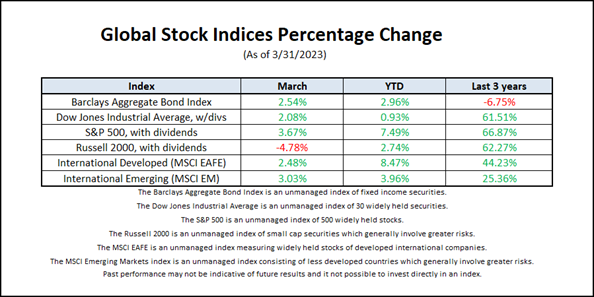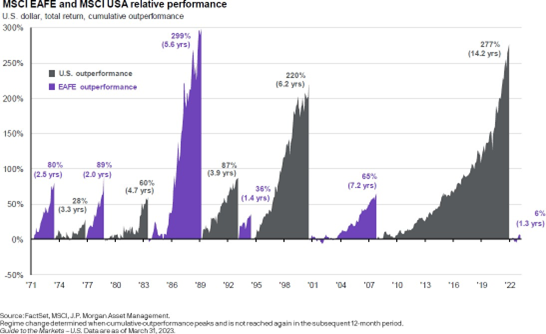“The stock market is a device to transfer money from the impatient to the patient.”
~ Warren Buffett
March provided a rather interesting month for Investors amid the news flow. Stocks and bonds continue to have a good start to the year, several of 2022’s underperforming sectors have experienced a notable turnaround, highlighting investors’ willingness to look beyond near-term challenges in an attempt to front run a potentially more dovish Federal Reserve.
From a performance perspective, the S&P 500 (U.S. Large cap index) lead the way outpacing the Russell 2000 (U.S. Small cap index). This divergence in performance can be attributed to the higher weight of financials and lower weight of technology in the small cap index relative to the large cap index.
International developed markets are keeping pace and outperforming the U.S. on a year-to-date basis. See below chart of the month. This is largely thanks to cheaper relative valuations and surprisingly robust earnings. The return to a positive interest rate environment has seen well-capitalized European financials benefit, while European industrials were supported by lower-than-feared energy costs.
Turning to the bond market, the prospect of a dovish shift by the Fed in response to the banking crisis led yields to decline. As a result bond performance has turned positive after a dismal 2022. Current yields on bonds, are off their highs, but remain attractive in my opinion, especially for Investors looking to diversify their equity exposure over concerns of a recession.
This is a challenging time for Investors. Many investors are asking themselves are the lows in? Will the Federal Reserve hike rates again in May? Is this a time to be more defensive or add risk? Check out this month’s article of the month. I think it does a great job capturing the current environment and mood. These are confusing times however it makes sense to maintain perspective and avoid emotional responses that could potentially affect long-term plans.
Please reach out with questions.
–Paul
Noteworthy Links:
- RJ: The case for high(er) for longer is still intact
- AQR: Emerging Market Stocks Have Best Return Profile in 20 Years
- RJ: Investment Strategy Quarterly

Chart of the Month
For the first time in the long time, International stocks are outperforming the US

Article of the Month
When Headlines Worry You, Bank on Investment Principles
By Dimensional Funds
Published March 15th, 2023
On Friday, March 10, regulators took control of Silicon Valley Bank as a run on the bank unfolded. Two days later, regulators took control of a second lender, Signature Bank. With increasing anxiety, many investors are eyeing their portfolios for exposure to these and other regional banks.
Rather than rummaging through your portfolio looking for trouble when headlines make you anxious, turn instead to your investment plan. Hopefully, your plan is designed with your long-term goals in mind and is based on principles that you can stick with, given your personal risk tolerances. While every investor’s plan is a bit different, ignoring headlines and focusing on the following time-tested principles may help you avoid making shortsighted missteps.
1. Uncertainty Is Unavoidable
Remember that uncertainty is nothing new and investing comes with risks. Consider the events of the last three years alone: a global pandemic, the Russian invasion of Ukraine, spiking inflation, and ongoing recession fears. In other words, it may have seemed as if there were plenty of reasons to panic. Despite these concerns, for the three years ending February 28, 2023, the Russell 3000 Index (a broad market-capitalization-weighted index of public US companies) returned an annualized 11.79%, slightly outpacing its average annualized returns of 11.65% since inception in January 1979. The past three years certainly make a case for weathering short-term ups and downs and sticking with your plan.
2. Market Timing Is Futile
Inevitably, when events turn bleak and headlines warn of worse to come, some investors’ thoughts turn to market timing. The idea of using short-term strategies to avoid near-term pain without missing out on long-term gains is seductive, but research repeatedly demonstrates that timing strategies are not effective. The impact of miscalculating your timing strategy can far outweigh the perceived benefits.
3. “Diversification Is Your Buddy”
Nobel laureate Merton Miller famously used to say, “Diversification is your buddy.” Thanks to financial innovations over the last century in the form of mutual funds, and later ETFs, most investors can access broadly diversified investment strategies at very low costs. While not all risks—including a systemic risk such as an economic recession—can be diversified away (see Principle 1 above), diversification is still an incredibly effective tool for reducing many risks investors face. In particular, diversification can reduce the potential pain caused by the poor performance of a single company, industry, or country.1 As of February 28, Silicon Valley Bank (SIVB) represented just 0.04% of the Russell 3000, while regional banks represented approximately 1.70%.2 For investors with globally diversified portfolios, exposure to SIVB and other US-based regional banks likely was significantly smaller. If buddying up with diversification is part of your investment plan, headline moments can help drive home the long-term benefits of your approach.
When the unexpected happens, many investors feel like they should be doing something with their portfolios. Often, headlines and pundits stoke these sentiments with predictions of more doom and gloom. For the long-term investor, however, planning for what can happen is far more powerful than trying to predict what will happen.
FOOTNOTES
1 Consider that a study of single stock performance in the US from 1927 to 2020 illustrated that the survival of any given stock is far from guaranteed. The study found that on average for 20-year rolling periods, about 18% of US stocks went through a “bad” delisting. The authors note that delisting events can be “good” or “bad” depending on the experience for investors. For example, a stock delisting due to a merger would be a good delist, as the shareholders of that stock would be compensated during the acquisition. On the other hand, a firm that delists due to its deteriorating financial condition would be a bad delist since it is an adverse outcome for investors. Given these results, there is a good case to avoid concentrated exposure to a single company. Source: “Singled Out: Historical Performance of Individual Stocks” (Dimensional Fund Advisors, 2022).
2 Regional banks weight reflects the weight of the “Regional Banks” GICS Sub-Industry. GICS was developed by and is the exclusive property of MSCI and S&P Dow Jones Indices LLC, a division of S&P Global.
Here is a link to the full article: When Headlines Worry You, Bank on Investment Principles
*Raymond James & Associates, Inc, member New York Stock Exchange/SIPC
*The information contained in this report does not purport to be a complete description of the securities, markets, or developments referred to in this material, and is not a recommendation. There is no guarantee that these statements, opinions or forecasts provided herein will prove to be correct.
*Views expressed are the current opinion of the author, but not necessarily those of Raymond James. The author’s opinions and forward looking statements expressed are subject to change without notice. This information does not constitute a solicitation or an offer to buy or sell any security. Information contained in this report was received from sources believed to be reliable, but accuracy is not guaranteed.
*There is no assurance any investment strategy will be successful. Investing involves risk and you may incur a profit or loss regardless of strategy selected, including diversification and asset allocation. Past performance may not be indicative of future results. International investing involves additional risks such as currency fluctuations, differing financial accounting standards, and possible political and economic instability. These risks are greater in emerging markets. Small- and mid-cap securities generally involve greater risks and are not suitable for all investors. Asset allocation and diversification do not guarantee a profit nor protect against a loss. Individual investor’s results will vary.
*Gross Domestic Product (GDP) is the annual market value of all goods and services produced domestically by the U.S. Past performances are not indicative of future results. Investing always involves risk and you may incur a profit or loss. No investment strategy can guarantee success.
*This information contains forward-looking statements about various economic trends and strategies. You are cautioned that such forward-looking statements are subject to significant business, economic and competitive uncertainties and actual results could be materially different. There are no guarantees associated with any forecast and the opinions stated here are subject to change at any time and are the opinion of the individual strategist. Data comes from the following sources: Census Bureau, Bureau of Labor Statistics, Bureau of Economic Analysis, the Federal Reserve Board, and Haver Analytics. Data is taken from sources generally believed to be reliable but no guarantee is given to its accuracy.
*Links are being provided for information purposes only. Raymond James is not affiliated with and does not endorse, authorize, or sponsor any of the listed websites or their respective sponsors. Raymond James is not responsible for the content of any web site or the collection or use of information regarding any web site’s users and or/members.
*Certified Financial Planner Board of Standards Inc. owns the certification marks CFP®, CERTIFIED FINANCIAL PLANNER™ and Federally registered CFP (with flame design) in the U.S., which it awards to individuals who successfully complete CFP Board’s Initial and ongoing certification requirements.
*The S&P 500 is an unmanaged index of 500 widely held stocks that is generally considered representative of the U.S. stock market.
Insights & Discovery